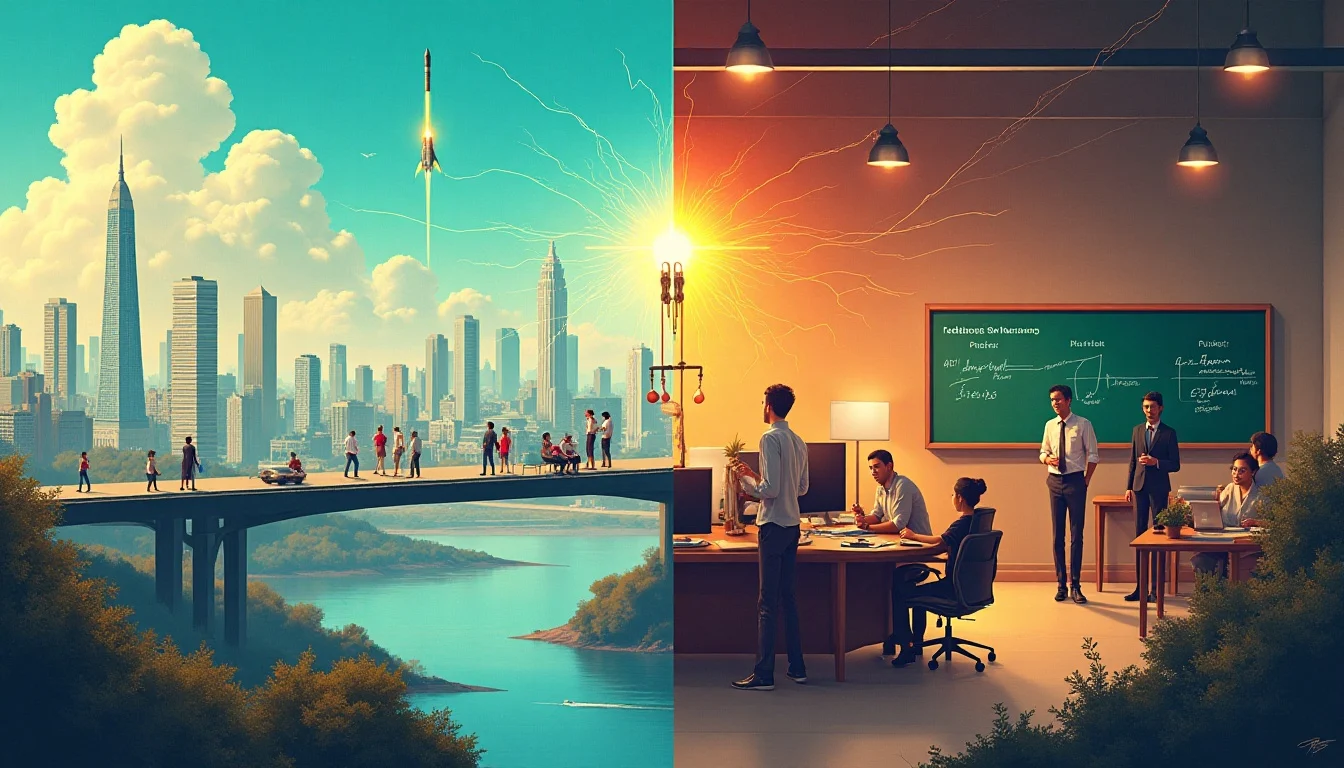Introduction
From semiconductors to search engines, and now to the frontiers of artificial intelligence, Silicon Valley has built an unparalleled legacy of innovation. Apple, Google, OpenAI, and countless startups have emerged not by accident, but from a deeply embedded cultural DNA.
This begs the question: What makes Silicon Valley’s ecosystem so unique and difficult to replicate — and why does India, despite its immense talent pool and growing startup landscape, continue to lag behind?
The answer lies not in infrastructure or funding, but in mindset. Let’s explore the fundamental mental and cultural frameworks that define Silicon Valley — and what India must evolve to match its pace.
Embracing Misfits & Non-Conformity
In Silicon Valley, the weirder your idea, the more likely it is to be taken seriously.
- OpenAI, now a global leader in artificial intelligence, was initially ridiculed—even by AI experts.
- SpaceX and Tesla were dismissed as vanity projects until they reshaped space and automotive industries.
This culture rewards contrarian thinking and encourages founders to challenge norms, take bold bets, and push boundaries.
In contrast, India’s education system fosters rote learning and conformity, valuing obedience over original thought. Those who deviate from conventional paths often face social and familial resistance.
“In India, the oddballs are filtered out early. In the Valley, they’re celebrated.”
![]()
Experimentation Over Perfection
Silicon Valley thrives on iteration. Startups launch, fail, learn, and pivot—fast.
- A16Z’s founders tried dozens of projects before finding product-market fit.
- Jeff Bezos famously operates on the “70% rule,” making big decisions with only 70% of the information to stay ahead.
Meanwhile, Indian entrepreneurs often delay execution, waiting for perfect conditions or 100% certainty. This risk-averse mindset leads to missed opportunities and slow progress.
“Perfection is the enemy of innovation. In the Valley, it’s okay to ship rough, as long as you learn fast.”
Optimism as Fuel
The default mindset in Silicon Valley is: “It might work.”
- Founders raise millions for ideas like AI avatars or flying cars, even before tangible results.
- There’s belief in moonshots, driven by an optimism that progress is inevitable.
In India, many ambitious ideas are met with skepticism or dismissed outright as scams. For example, a Reddit user raised donations to build AI avatars but was mocked rather than supported.
This negativity discourages dreamers and keeps groundbreaking ideas underground.
Failure as a Badge of Honor
In the Valley, failure isn’t shameful—it’s expected.
- Elon Musk openly talks about how failure is part of the journey.
- Failed startups are often seen as valuable learning experiences, even badges of honor on a resume.
In India, however, failure is stigmatized. A failed business is seen as personal incompetence, often leading to social alienation or pressure to pursue “safer” careers.
“If failure means you’re out of the game, who will dare to play?”

Ecosystem & Social Capital
Silicon Valley thrives because it’s a networked ecosystem:
- Mentorship is widely accessible.
- Founders share ideas, talent, and even competitors’ insights.
- The culture encourages collaboration over gatekeeping.
In contrast, India’s startup scene often suffers from:
- Nepotism in funding and hiring.
- Status-driven choices—people choose jobs based on prestige rather than passion or fit.
Until collaboration replaces hierarchy, India’s innovation ecosystem will remain stunted.
Marketing x Product Synergy
Great Valley founders are storytellers as much as they are builders.
- Steve Jobs didn’t just make good products; he made people believe in them.
- Sam Altman balances product execution with visionary marketing, setting narratives that shift industries.
In India, many founders focus solely on tech or product—undervaluing marketing as a strategic lever. This disconnect leads to underwhelming launches and missed traction.
“You can’t just build it and hope they’ll come. You have to sell the story.”
Conclusion: Bridging the Mindset Gap
India doesn’t lack talent. Nor does it lack capital or ambition.
What it needs is a cultural reset:
- Celebrate experimentation over perfection.
- Normalize failure as a step, not an endpoint.
- Foster optimism that moonshots are worth trying.
- Empower misfits who challenge the status quo.
The Silicon Valley mindset is not geography-bound—it’s a mental model, one that Indian entrepreneurs and policymakers must consciously adopt.
“We don’t need to copy Silicon Valley. We need to cultivate the conditions that make it possible.”
Frequently Asked Questions (FAQs)
1. Can India replicate Silicon Valley? India can’t clone Silicon Valley, but it can develop its own version by fostering risk-taking, collaboration, and a bias for innovation.
2. Why does failure stigma hinder innovation in India? Fear of social judgment discourages entrepreneurs from taking bold risks, which limits experimentation and breakthrough ideas.
3. What’s the Silicon Valley mindset? It’s a culture of embracing misfits, tolerating failure, rapidly iterating, and supporting audacious ideas with optimism.
4. How can Indian founders change their approach? By valuing storytelling, accepting failure as learning, acting faster with less data, and seeking mentorship beyond their comfort zones.